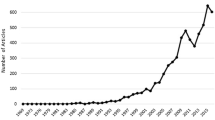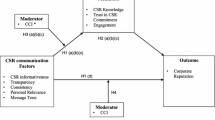Abstract
During the last decade corporate reputation as one of the central efforts of corporate citizenship behavior has gained increasing attention in scholarly research, as has the way that reputation can serve as an instrument for business purposes. This poses the question of how such reputation will be achieved. To answer these questions this article examines Cicero’s considerations concerning the interrelation of honorableness and beneficialness made in his work ‘On Duties’. Based on Cicero’s understanding of universal natural law and his idea that reputation derives solely from honorable behavior and the orientation in the common good, we show that also corporate reputation is achieved only if it is based primarily on ‘honorableness’, and that reputation is lost if financial interests override the intentions of honesty of a company.


Similar content being viewed by others
References
Barnett, M. L., Jermier, J. M., & Lafferty, B. A. (2006). Corporate reputation: The definitional landscape. Corporate Reputation Review, 9(1), 26–38.
Bendixen, M., & Abratt, R. (2007). Corporate identity, ethics and reputation in supplier–buyer relationships. Journal of Business Ethics, 76(1), 69–82.
Bennett, R., & Kottasz, R. (2000). Practitioner Perceptions of Corporate reputation: An empirical investigation. Corporate Communications, 5(4), 224–234.
Bix, B. H. (2002). Natural law: The modern tradition. In J. L. Coleman & S. Shapiro (Eds.), Oxford handbook of jurisprudence and philosophy of law (pp. 61–103). Oxford: Oxford University Press.
Bragues, G. (2010). Profiting with honor: Cicero’s vision of leadership. Journal of Business Ethics, 97(1), 21–33.
Brammer, S., & Millington, A. (2005). Corporate reputation and philanthropy: An empirical analysis. Journal of Business Ethics, 61(1), 29–44.
Büchner, K. (1989). Nachwort. In M. T. Cicero (Ed.), Über die Rechtlichkeit (pp. 133–147). Stuttgart: Reclam.
Cicero, M. T. (2004). Letters to Atticus (Vol. 5). Cambridge: Cambridge University Press.
Cicero, M. T. (2009a). On duties. Cambridge: Cambridge University Press.
Cicero, M. T. (2009b). On the laws. In J. E. G. Zetzel (Ed.), On the commonwealth and on the laws. Cambridge: Cambridge University Press.
Cicero, M. T. (2009c). On the commonwealth. In J. E. G. Zetzel (Ed.), On the commonwealth and on the laws. Cambridge: Cambridge University Press.
Cicero, M. T. (2010). On moral ends. Cambridge: Cambridge University Press.
Corso de Estrada, L. E. (2008). Marcus Tullius Cicero and the role of nature in the knowledge of moral good. In A. N. García, M. Šilar, & J. M. Torralba (Eds.), Natural law: Historical, systematic and juridical approaches (pp. 9–22). Newcastle: Cambridge Scholars Publishing.
De Castro, G. M., López, J. E. N., & Sáez, P. L. (2006). Business and social reputation: Exploring the concept and main dimensions of corporate reputation. Journal of Business Ethics, 63(4), 361–370.
De George, R. T. (1995). Business ethics. Englewood Cliffs: Prentice Hall.
Dyck, A. R. (1996). A commentary on Cicero, De Officiis. Ann Arbor: University of Michigan Press.
Fombrun, C. J. (1996). Reputation. Boston: Harvard Business School Press.
Fombrun, C. J. (2001). Corporate reputation as economic assets. In M. A. Hitt, R. E. Freeman, & J. S. Harrison (Eds.), Handbook of strategic management (pp. 289–311). Oxford: Blackwell Publishers.
Fombrun, C. J., & Gardberg, N. (2000). Who’s tops in corporate reputation? Corporate Reputation Review, 3(1), 13–17.
Fombrun, C. J., & Van Riel, C. (1997). The reputational landscape. Corporate Reputation Review, 1(1–2), 5–13.
French, P. A. (1984). The principle of responsive adjustment in corporate moral responsibility: The crash on Mount Erebus. Journal of Business Ethics, 3(2), 101–111.
Gardberg, N. A., & Fombrun, C. J. (2006). Corporate citizenship: Creating intangible assets across institutional environments. Academy of Management Review, 31(2), 329–346.
Gärtner, H. A. (1974). Cicero and Panaitios. Heidelberg: Carl Winter Universitätsverlag.
Goldin, O. (2006). Ciceronian business ethics. Studies in the History of Ethics, 12. Retrieved January 31, 2013, from http://www.historyofethics.org/112006/GoldinCiceronianBusEthics.pdf.
Horn, Ch. (2002). Politische Gerechtigkeit bei Cicero und Augustinus. Internationale Zeitschrift für Philosophie, 11(2), 181–204.
Horsley, R. A. (1978). The law of nature in Philo and Cicero. Harvard Theological Review, 7(1–2), 35–59.
ISO 26000. (2010). International Standard ISO 26000—Guidance on Social Responsibility. Geneva: ISO 26000:2010(E).
Kapust, D. (2011). Cicero on decorum and the morality of rhetoric. European Journal of Political Theory, 10(1), 92–112.
Koehn, D. (2010). Evolution in the society for business ethics. Business Ethics Quarterly, 20(4), 747–748.
Kries, D. (2003). On the intention of Cicero’s De Officiis. The Review of Politics, 65(4), 375–393.
Lai, C.-S., Chiu, C.-J., Yang, C.-F., & Pai, D.-C. (2010). The effects of corporate social responsibility and brand performance: The mediating effect of industrial brand equity and corporate reputation. Journal of Business Ethics, 3(95), 457–469.
Lange, D., Lee, P. M., & Dai, Y. (2011). Organizational reputation: A review. Journal of Management, 37(1), 153–184.
Lewellyn, P. G. (2002). Corporate reputation. Business and Society, 41(4), 446–455.
Mahon, J. F. (2002). Corporate reputation: A research agenda using strategy and stakeholder literature. Business and Society, 41(4), 415–445.
Melé, D. (2009). Business ethics in action. Seeking human excellence in organizations. New York: Palgrave-MacMillan.
Merklin, H. (1989). Einleitung. In M. T. Cicero (Ed.), De finibus bonorum et malorum (pp. 3–51). Stuttgart: Reclam Verlag.
Morris, C. W. (1999). What is the thing called “reputation”? Business Ethics Quarterly, 9(1), 87–102.
Nussbaum, M. C. (2001). Ethics and political philosophy—Lecture and colloquium in Münster 2000. Münster: Lit Verlag.
Perrow, C. (1961). Organizational prestige: Some functions and dysfunctions. American Journal of Sociology, 66(4), 335–341.
Pope, S. J. (2005). Natural law in catholic social teachings. In K. R. Himes (Ed.), Modern catholic social teaching—Commentaries and interpretations (pp. 41–71). Washington, DC: Georgetown University Press.
Porter, M. E., & Kramer, M. E. (2006). Strategy and society. The link between competitive advantage and corporate social responsibility. Harvard Business Review, 84(1), 1–14.
Preston, L. E. (2004). Reputation as a source of corporate social capital. Journal of General Management, 30, 43–49.
Radford, R. T. (2002). A study in the origins of republican philosophy. New York: Value Inquiry Books.
Rindova, V. P., Williamson, I. O., Petkova, A. P., & Sever, J. M. (2005). Being good or being known: An empirical examination of the dimensions, antecedents, and consequences of organizational reputation. Academy of Management Journal, 48(6), 1033–1049.
Roloff, J., & Aßländer, M. S. (2010). Autonomy in buyer–supplier-relationships: The case of unsafe mattel toys. Journal of Business Ethics, 97(4), 517–534.
Rose, C., & Thomsen, S. (2004). The impact of corporate reputation on performance: Some Danish evidence. European Management Journal, 22(2), 201–210.
Sánchez, J. L. F., & Sotorrío, L. L. (2007). The creation of value through corporate reputation. Journal of Business Ethics, 76(3), 335–346.
Shenkar, O., & Yuchtman-Yaar, E. (1997). Reputation, image, prestige, and goodwill: An interdisciplinary approach to organizational standing. Human Relations, 50(11), 1361–1381.
Sims, R. R. (2000). Changing an organization’s culture under new leadership. Journal of Business Ethics, 25(1), 65–78.
Sims, R. R. (2009). Toward a better understanding of organizational efforts to rebuild reputation following an ethical scandal. Journal of Business Ethics, 90(4), 453–472.
Sims, R. R., & Brinkmann, J. (2002). Leaders as moral role models: The case of John Gutfreund at Salomon Brothers. Journal of Business Ethics, 35(4), 327–339.
Sims, R. R., & Brinkmann, J. (2003). Enron ethics: (or culture matters more than codes). Journal of Business Ethics, 45(3), 243–256.
Torralba, J. M. (2012). Stoic Kατóρθωμα, Perfect Duty and Kant’s Notion of Acting aus Pflicht. The Relevance of the Oíκεíωσiς Doctrine for the Notions of Moral Good and Inner Attitude (Gesinnung) in Kantian Ethics. In A. G. Vigo (Ed.), Oikeiosis and the natural bases of morality. From classical stoicism to modern philosophy (pp. 295–346). Hildesheim: Georg Olms Verlag.
Wartick, S. L. (1992). The relationship between intense media exposure and change in corporate reputation. Business and Society, 31(1), 33–49.
Wartick, S. L. (2002). Measuring corporate reputation. Business and Society, 41(4), 371–392.
West, T. G. (1981). Cicero’s teaching on natural law. St. John’s Review, 32(2), 74–81.
Wood, N. (1991). Cicero’s social and political thought. Berkley: University of California Press.
Author information
Authors and Affiliations
Corresponding author
Rights and permissions
About this article
Cite this article
Aßländer, M.S. Honorableness or Beneficialness? Cicero on Natural Law, Virtues, Glory, and (Corporate) Reputation. J Bus Ethics 116, 751–767 (2013). https://doi.org/10.1007/s10551-013-1819-7
Received:
Accepted:
Published:
Issue Date:
DOI: https://doi.org/10.1007/s10551-013-1819-7




